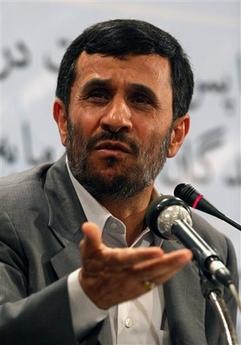国际英语新闻:Iran ready to fill any vacuum in Iraq
TEHRAN, Iran -- Iranian President Mahmoud Ahmadinejad boldly declared Tuesday that US political influence in Iraq is "collapsing rapidly" and said his government is ready to help fill any power vacuum.
 Iranian President Mahmoud Ahmadinejad speaks with media during a press conference in Tehran, Iran, Tuesday, Aug. 28, 2007. [AP] |
The leader also defended Iraqi Prime Minister Nouri al-Maliki, a fellow Shiite Muslim who has been harshly criticized by American politicians for his unsuccessful efforts to reconcile Iraq's Sunnis, Shiites and Kurds.
"The political power of the occupiers is collapsing rapidly," Ahmadinejad said at a news conference, referring to US troops in Iraq. "Soon, we will see a huge power vacuum in the region. Of course, we are prepared to fill the gap, with the help of neighbors and regional friends like Saudi Arabia, and with the help of the Iraqi nation."
Ahmadinejad did not elaborate on his remarks, an unusual declaration of Iran's interest in influencing its neighbor's future. Even though Saudi Arabia and Iran have not cooperated in the past, it "doesn't mean it can't happen," Ahmadinejad said.
Iran fought a brutal eight-year war with Saddam Hussein's regime and welcomed the elimination of a deeply hated enemy. Iran also strongly objects to the presence of America, another rival, over its eastern and western borders in Afghanistan and Iraq.
"Occupation is the root of all problems in Iraq," Ahmadinejad said. "It has become clear that occupiers are not able to resolve regional issues."
President Bush defended the Iraq war in a speech at the American Legion's national convention and accused Iran of violating human rights and trying to destabilize Iraq, Afghanistan and the wider region.
"Iran is sending arms to the Taliban in Afghanistan to be used to attack American and NATO troops," Bush said. "Iran has arrested visiting American scholars who have committed no crimes and impose no threat to their regime. And Iran's active pursuit of technology that could lead to nuclear weapons threatens to put a region already known for instability and violence under the shadow of a nuclear holocaust. Iran's actions threaten the security of nations everywhere."
Bush and the US ambassador in Iraq have given blunt assessments of political stagnation in Baghdad, and Bush has said it is up to the Iraqi people to decide if their government deserved to be replaced.
But key Democratic politicians, including Sen. Hillary Rodham Clinton, have called for al-Maliki to be replaced because his Shiite-dominated government has been unable to forge national unity.
Al-Maliki has shrugged off the gloomy assessments of Iraq's future, saying he would "pay no attention" to American critics and if necessary "find friends elsewhere."
"They rudely say (the Iraqi) prime minister and the constitution must change," Ahmadinejad said of US critics. "Who are you? Who has given you the right" to ask for such a change, he added.
Ousting al-Maliki, a longtime Shiite political activist, would require a majority vote in the 275-member Iraqi parliament. As long as the Kurdish parties and the main Shiite bloc back al-Maliki, his opponents lack the votes for that.
In a move that could further strain US-Iranian relations, US troops raided a Baghdad hotel Tuesday night and detained about 10 people, including six whom a US-funded radio station described as members of an Iranian delegation visiting to negotiate contracts with the Iraqis.
The Iranian Embassy said seven Iranians - an embassy employee and six members of a delegation from Iran's Electricity Ministry - were staying at the Sheraton Ishtar Hotel.
Iran has been vehemently protesting the detention of five Iranians by US troops in the northern Iraqi city of Irbil in January. US authorities have said the five included the operations chief and other members of Iran's elite Quds Force, which is accused of arming and training Iraqi militants.
Iran describes the five, who remain in US custody, as diplomats.
Washington has accused Tehran of being behind attacks on US troops in Iraq - a claim al-Maliki's government has only partially backed, saying Iran could have a role in the attacks. Iran has denied the charges.
Ahmadinejad dismissed the possibility of any US military action against Iran, saying Washington has no plan and is not in a position to take such action.
As Ahmadinejad spoke, fighting between rival Shiite factions in southern Iraq raised new fears that a pullout by British troops there could lead to chaos. The clashes appeared to be part of a struggle for power of southern Iraqi Shia heartland, which includes the bulk of the country's vast oil wealth.
相关文章
- 欧美文化:Emergency rooms see more gun violence victims in U.S. in 1st year of pandemic: CNN
- 欧美文化:Sri Lankan military authorized to maintain law, order amid unrest
- 欧美文化:Russian FM visits Algeria to mark 60th anniversary of ties
- 欧美文化:Spanish government sacks spy chief after phone tapping scandal
- 欧美文化:Turkey, Kazakhstan aim to reach 10 bln USD in bilateral trade: president
- 欧美文化:UN chief condemns attacks on civilians by armed group in DRC
- 欧美文化:Moroccan, Egyptian FMs discuss prospects of bolstering cooperation
- 欧美文化:Macron visits Berlin on first foreign trip after re-election
- 欧美文化:Ukrainian president, Swedish PM discuss defense support for Ukraine over phone
- 欧美文化:Lebanon condemns deadly attack in Egypt's Sinai




 手机网站
手机网站